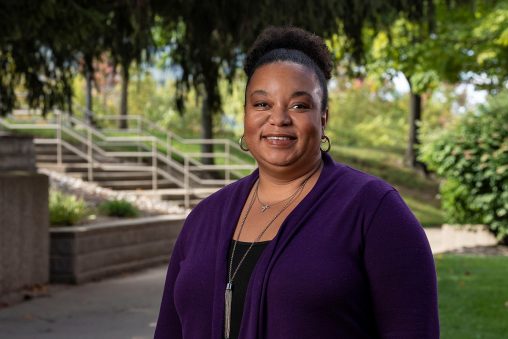
Romena Holbert, associate professor of teacher education at Wright State, is overseeing a grant project to provide high-dosage tutoring to students in four local school districts.
Romena Holbert, Ph.D., associate professor of teacher education at Wright State University, recently received an Ohio Department of Education (ODE) grant to address the learning disruptions that local students experienced in mathematics and literacy due to the COVID-19 pandemic.
ODE identified that the impact that the pandemic had on student learning was significant, with notably lower scores in math and literacy in 2020-2021. This is especially true when it came to Ohio’s historically underserved students and became even more pronounced in districts that primarily used a remote or hybrid education delivery model.
More than $6.8 billion in federal COVID relief funds have been allocated to schools and districts since the beginning of the pandemic. Leveraging these funds, the Ohio Department of Education is promoting statewide tutoring in K-12 mathematics and literacy through partnerships with the Ohio Department of Higher Education and Ohio Institutions of Higher Education to support districts and students.
“These learning opportunities for our students have the potential to decrease the academic impact of lost instruction time due to the pandemic. The main objective is to use these funds to provide high-quality tutoring to accelerate learning,” said Holbert.
One of the ways these learning deficits are being addressed is high-dosage tutoring. High-dosage tutoring is defined by the Annenberg Institute as tutoring students more than three days a week or at least 50 hours over 36 weeks.
However, Ohio school districts are able to tailor the delivery to the needs of their students and have worked with Ohio Institutions of Higher Education partners to develop customized programs to make high dosage tutoring available to students.
Studies have found that high-dosage tutoring increased achievement by roughly an additional three to 15 months of learning across grade levels.
Holbert said that although the individual districts are best equipped to know the needs of their student population, they often have difficulty recruiting the number of adults they need to provide tutoring services.
Through the ODE grant, Wright State is partnering with the University of Dayton and Learn to Earn to provide tutors to four school districts within the Dayton region.
These include Fairborn, Huber Heights and West Carrollton, where students will receive afterschool tutoring using high-impact literacy and mathematics programs that have been approved by the state, and Dayton Public Schools, where students will receive tutoring services during the school day in a way that extends existing initiatives.
Tracey Kramer, director of the Office of Partnerships and Field Experiences (OPFE) in the College of Health, Education and Human Services and a member of the grant team, said, “OPFE seeks to collaborate with our school partners to create mutually beneficial endeavors for all parties. This grant work is a prime example of a win-win initiative for all.”
The $637,000 state grant will benefit local students and Wright State and University of Dayton students, Kramer said.
“Many of the college students who will be serving as tutors also want to become educators within the region as a career path,” she said. “The opportunity to have an early paid start is a great asset to their learning.”
The grant runs through the spring of 2024. Tutors will work about six hours per week at a rate of $15 an hour. The grant also supports paid training to help tutors deepen their teaching skills and relate to students’ social and interpersonal needs.
A posting for this position for students is currently on Handshake. All applicants are welcome.

 Adventures await
Adventures await  Wright State to expand nursing facilities to meet workforce needs and prepare more graduates for in-demand careers
Wright State to expand nursing facilities to meet workforce needs and prepare more graduates for in-demand careers  Wright State student-athletes make a lasting impact on local family with more to come
Wright State student-athletes make a lasting impact on local family with more to come  Wright State names Rajneesh Suri dean of Raj Soin College of Business
Wright State names Rajneesh Suri dean of Raj Soin College of Business  ‘Only in New York,’ born at Wright State
‘Only in New York,’ born at Wright State 